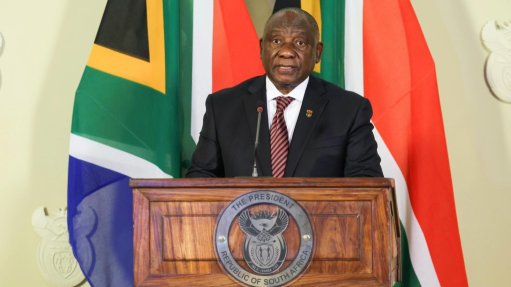Shared costs, big gains
Ivorian President Alassane Ouattarra took some hits last week as I criticised Zimbabwe’s decision to splash $200-million on luxury villas and other infrastructure ahead of the Southern African Development Community summit on August 17, which it hosted at the new, Chinese-funded Parliament building about 25 km from Harare. My beef was that this extravagance comes at a time when the country is begging donors for $2-billion to stave off a severe food shortage caused by El Niño-related crop failures in the 2023/24 season.
I criticised Ouattara for electing to host the thirty-fourth Africa Cup of Nations (Afcon) tournament in January this year at a cost of $1-billion, in a country where more than half the population lives on $1.25 or less a day. There may have been short-term economic gains, such as the cash spent by tens of thousands of foreign fans and others on transport, accommodation, meals and entertainment, but conventional wisdom is that such huge expenditure will never be recouped.
Some of the new stadiums built for past tournaments quickly became white elephants. A notable example is Cameroon, the host in 2021. The newly built stadiums, with capacities of 40 000, now often see only a fraction of this number at domestic games, an expensive reminder of the fleeting nature of such investments.
Ghana has had a somewhat different – but equally unpalatable – experience. The country invested $40-million in building the Essipong stadium in the city of Sekondi, one of four venues used for the 2008 tournament. Fast-forward to 2024: its roof has caved in, the toilets are broken and the pitch needs major repairs. The Ghanaian government estimates it will require about $3-million – more than R50-million – to restore the facility.
I am revisiting the topic of Afcon because there is a case for hosting this biennial event. But it’s crucial that this doesn’t come at the expense of more pressing priorities, especially for less resourced countries.
The strain on host nations has increased since the number of participating teams was expanded from 16 to 24 in 2019. This requires more stadiums than before, and they must be of a quality that passes the organisers’ rigorous muster. Cote d’Ivoire didn’t have a sufficient number of top-notch stadiums, which is why it had to spend a staggering $1-billion on building new facilities and upgrading roads and other infrastructure. Ouattara talked the Chinese into providing some of the money, but the bulk came from the West African country’s own coffers.
Morocco will host the next tournament – from December 21 next year to January 18, 2026. Given that Morocco boasts some of the best facilities on the continent and that it has presented six existing stadiums for the tournament, there shouldn’t be any issues.
I am impressed with East African neighbours Kenya, Uganda and Tanzania, which successfully bid for the right to co-host the 2027 iteration. Each will provide three existing stadiums, so no new facilities are required.
Other football-loving African nations that might not have abundant cash should take a leaf out of the East Africans’ copybook. Even Europeans and Americans are now doing it. Morocco, the Afcon host in 2025/26, has teamed up with Portugal and Spain to jointly host the FIFA World Cup in 2030. Similarly, Canada, Mexico and the US will co-host the 2026 World Cup.
We really must pursue this approach. The benefits are substantial, as confirmed by an empirical study published in January, the culmination of analyses of statistics from past tournaments.
The short-term benefits include employment, with the Equatorial Guinea event in 2015 having generated 10 000 direct and indirect jobs. Then there is urban renewal, a boost to local businesses, social upliftment, national unity and much more.
Hosting a tournament of the magnitude of Afcon can also be a tremendous boon in the long term. The benefits include the legacy infrastructure that is developed, global branding and enhanced international perception, among others.
With co-hosting, all these benefits accrue without burning a hole in countries’ budgets. It’s like scoring a winning goal without much effort.
Article Enquiry
Email Article
Save Article
Feedback
To advertise email advertising@creamermedia.co.za or click here
Announcements
What's On
Subscribe to improve your user experience...
Option 1 (equivalent of R125 a month):
Receive a weekly copy of Creamer Media's Engineering News & Mining Weekly magazine
(print copy for those in South Africa and e-magazine for those outside of South Africa)
Receive daily email newsletters
Access to full search results
Access archive of magazine back copies
Access to Projects in Progress
Access to ONE Research Report of your choice in PDF format
Option 2 (equivalent of R375 a month):
All benefits from Option 1
PLUS
Access to Creamer Media's Research Channel Africa for ALL Research Reports, in PDF format, on various industrial and mining sectors
including Electricity; Water; Energy Transition; Hydrogen; Roads, Rail and Ports; Coal; Gold; Platinum; Battery Metals; etc.
Already a subscriber?
Forgotten your password?
Receive weekly copy of Creamer Media's Engineering News & Mining Weekly magazine (print copy for those in South Africa and e-magazine for those outside of South Africa)
➕
Recieve daily email newsletters
➕
Access to full search results
➕
Access archive of magazine back copies
➕
Access to Projects in Progress
➕
Access to ONE Research Report of your choice in PDF format
RESEARCH CHANNEL AFRICA
R4500 (equivalent of R375 a month)
SUBSCRIBEAll benefits from Option 1
➕
Access to Creamer Media's Research Channel Africa for ALL Research Reports on various industrial and mining sectors, in PDF format, including on:
Electricity
➕
Water
➕
Energy Transition
➕
Hydrogen
➕
Roads, Rail and Ports
➕
Coal
➕
Gold
➕
Platinum
➕
Battery Metals
➕
etc.
Receive all benefits from Option 1 or Option 2 delivered to numerous people at your company
➕
Multiple User names and Passwords for simultaneous log-ins
➕
Intranet integration access to all in your organisation

















